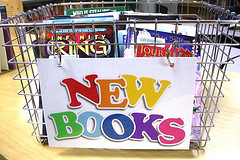Is Barnes & Noble’s Downsizing A Boon For Independent Booksellers?

(Enokson)
The American Booksellers Association recently announced that its ranks grew by 43 stores in 2012, as independent shops sprouted up from coast to coast.
Another good sign from that round-up is that six of those new stores are expansions of existing independent businesses, which would indicate that these smaller operations are not merely able to stay afloat, but also grow.
The L.A. Times’ Jacket Copy column has a good piece on the subject, with some quotes from area booksellers on why they believe they fill a niche in the community.
To us, there are three reasons that independent booksellers have the opportunity to thrive in a world where Borders is gone and Barnes & Noble is shrinking.
1. The Bound Book
The e-book format is continuing — and will only continue — to grow in popularity. But there is something to be said for not only being able to read from a physical, bound book, but to browse through them before buying. To some, a book isn’t merely something to be read, but can be an objet d’art, or a piece to complete a collection.
Think of readers who have been putting together the volumes of long-running series like Robert Jordan’s recenetly completed The Wheel of Time books, or George RR Martin’s in-progress A Song of Ice and Fire epic. While some fans are perfectly happy having print versions of the earlier books and e-book versions of everything that’s come out recently, many will want their bookshelves to house the entire series.
Of course, some independent stores realize this book-as-trophy factor. As we mentioned in November, one store in Brooklyn recently launched a First Editions Club, wherein hardcore book collectors can get their hands on guaranteed, author-signed copies of new releases.
And having the actual copy of the book in your hands before buying gives the reader the opportunity to scan a lot more than the sample pages you’ll see online.
2. The Sense of Discovery
We’re sure that many people have bounced around on Amazon or other sites and found something new and exciting. Yet it still doesn’t compare to the feeling of pacing the bookstore aisle and stumbling upon some title you’d never heard of before.
It might be wrong to judge a book by its cover, but bookstores have relied on customers doing that for ages. And it’s much easier for a customer to be seduced into buying a book because of slick cover art or a blurb from a well-regarded author when it’s right in front of him and not a thumbnail on a web page.
3. Used Books
As the ABA pointed out in its announcement, seven of the 43 newly opened independent stores are primarily selling used books.
For voracious readers, it’s these kinds of stores that provide an affordable outlet. Even if the prices of e-books drop in the coming years, they will still likely be more expensive than the bottom-dollar offerings you’ll find at some used book stores. Why spend $11 on an e-book when you can spend $2 on a used title? And some stores allow customers to trade in their purchases in exchange for more books.
On the higher end of the used book market, there are those stores that appeal to the aforementioned collectors. You won’t find a first edition of a William Styron novel sitting around your Barnes & Noble (unless someone dropped it by accident), and you could try bidding for one on eBay, but you won’t know the true condition of what you’re buying until it arrives.
So here’s hoping that we’re not completely off the mark on these assumptions and that independent booksellers continue to pop up, even while the biggest chain fades.
Want more consumer news? Visit our parent organization, Consumer Reports, for the latest on scams, recalls, and other consumer issues.

